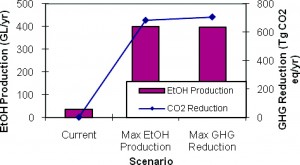In a report that will be published soon,”Decomposition Analysis of U.S. Corn Use for Ethanol Production from 2001-2008,”the Department of Energy’s Oak Ridge National Laboratory concludes that the indirect land use change (ILUC) as a result from the expansion of corn ethanol production over the past decade has likely been “minimal to zero.” The study was requested by the California Air Resources Board (CARB), which has appointed several teams of expert working groups to assess the methodology and data that went into California’s Low Carbon Fuel Standard.
 In response to the news, Geoff Cooper, the Vice President for Research and Analysis for the Renewable Fuels Association remarked, “The most recent work on ILUC is showing that ethanol expansion in the U.S. simply isn’t incurring the type of land use changes that were originally hypothesized. The initial results recently presented by the Department of Energy are further proof that America can continue to meet its global responsibilities to provide food and feed, while simultaneously providing a cleaner, domestic alternative to petroleum—all without needing to bring new lands into agriculture.”
In response to the news, Geoff Cooper, the Vice President for Research and Analysis for the Renewable Fuels Association remarked, “The most recent work on ILUC is showing that ethanol expansion in the U.S. simply isn’t incurring the type of land use changes that were originally hypothesized. The initial results recently presented by the Department of Energy are further proof that America can continue to meet its global responsibilities to provide food and feed, while simultaneously providing a cleaner, domestic alternative to petroleum—all without needing to bring new lands into agriculture.”
The results of the study were released during the last CARB meeting focused on ILUC held last week. The time frame reviewed was during 2001-2008, when the U.S. ethanol industry more than quadrupled. The researchers concluded, “Empirical evidence does not support significant effects on U.S. commodity exports [and] other crops or cropland expansion in the U.S.”
“This should put the stake into the heart of the bizarre ILUC scheme. Here are some of the best scientists in the country – scientists who have no stake in the game – who found that ethanol had little to no impact from ILUC,” said Tom Buis, CEO of Growth Energy. “We must ask why California insists on going forward with a regulation that is based not just on controversial theory, but a theory that has been disproven.”
 Coinciding with the Oak Ridge National Laboratory’s research, a paper published in Environmental Science & Technology and authored by Bruce Dale and other researchers at Michigan State University, “Biofuels Done Right: Land Efficient Animal Feeds Enable Large Environmental and Energy Benefits,” found that significantly larger volumes of biofuels can be produced without incurring ILUC.
Coinciding with the Oak Ridge National Laboratory’s research, a paper published in Environmental Science & Technology and authored by Bruce Dale and other researchers at Michigan State University, “Biofuels Done Right: Land Efficient Animal Feeds Enable Large Environmental and Energy Benefits,” found that significantly larger volumes of biofuels can be produced without incurring ILUC.
“Using less than 30% of total U.S. cropland, pasture, and range, 400 billion liters (106 billion gallons) of ethanol can be produced annually without decreasing domestic food production or agricultural exports. This approach also reduces U.S. greenhouse gas emissions by 670 Tg CO2-equivalent per year, or over 10% of total U.S. annual emissions, while increasing soil fertility and promoting biodiversity. Thus we can replace a large fraction of U.S. petroleum consumption without indirect land use change,” the authors concluded in the paper.

